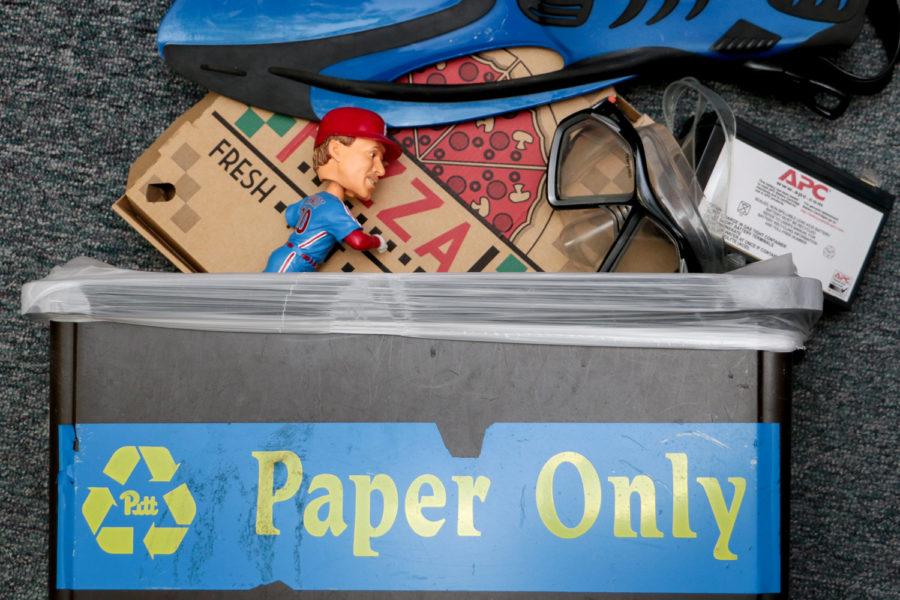Opinion | Pitt sustainability initiatives insufficient
Thomas Yang | Assistant Visual Editor
About 25 percent of all recycling picked up by waste management is sent straight to the landfill due to contamination, according to a study by The New York Times.
December 5, 2018
Perhaps the only thing Pitt loves more than Cathy is sustainability.
The school launched its “Year of Sustainability” — which set various sustainability goals for the University — in 2014, and ever since, has encouraged sustainability at an administrative level.
But it’s clear that students, who actually have the power to make a difference, are falling short of the University’s sustainability standards, so Pitt needs to reevaluate its approach to encouraging sustainability on campus.
The Pitt sustainability website homepage displays a colorful list of several basic sustainable tips — recycle, don’t take showers during heavy rain, turn out the lights, buy local food, etc. Below the list of tips, the website has a list of ways students can participate on campus, ranging from things such as drug take-back stations and the Pitt Pantry to Thriftsburgh and utilizing the recycling bins on campus.
But despite all of these student sustainability initiatives, the most basic rules of recycling haven’t permeated throughout the student body.
Recycling cans are often ridden with soiled food containers — such as greasy pizza boxes, half full Dunkin’ cups and Chipotle take-out bags with guacamole residue. Not only can these items not be recycled, but they can actually contaminate an entire batch of perfectly recyclable products if the contaminants spread.
Pitt spokesperson Joe Miksch did not respond in time for publication to specific questions, but provided The Pitt News with information directed toward students, including the Student Green Guide and a link to the Student Office of Sustainability’s website.
According to The New York Times, about 25 percent of all recycling picked up by waste management is sent straight to the landfill due to contamination. Miksch did not say how much recycling is sent to the landfill at Pitt.
Any object smaller than 2 by 2 inches cannot be recycled — including bottle caps, plastic straws and most plastic cutlery. Unfortunately, many students are unaware of the most basic recycling standards, making participating in sustainability nearly impossible.
The University of Northern Iowa did a 2014 survey and study of students on campus and found students often don’t recycle because they don’t know how.
“I honestly don’t think I have ever rinsed something out before I recycled it, which is scary because I consider myself a really conservation conscious person,” Emily Maloney, a sophomore majoring in speech language pathology, said. “I honestly don’t think any of my friends do that.”
It is not just a few clueless students who aren’t well informed on the basics of recycling — not all cities accept the same array of recyclables, which makes learning the specifics quite complicated.
On the bottom of all recyclable items, there is a number that determines the category of recycling the product belongs in. Pittsburgh does not recycle category No. 6 products, such as egg cartons or meat packages — even if they are rinsed — and most types of takeout containers.
The EPA recommends calling your township and asking what their recycling protocol is — but there are other, more student-friendly ways the City and the University can assist students with recycling.
The University provides recycling bins in each individual residence hall room and in various places around the campus — making recycling very accessible. The University’s sustainability initiatives are admirable, but they are pointless if they don’t call students to action — which they largely haven’t.
Instead of promoting a top-down approach to sustainability, Pitt should work with student organizations to have their message percolate into the student body — and that starts with holding regular workshops to combat sustainability illiteracy.
For example, if Pitt offered OCC credit for a Recycling 101-type seminar, they would likely get a very satisfying turnout.
“My residents are really determined to complete the OCC … a lot of them are really passionate about sustainability. I think the University would get a really good turnout and the topic fits the OCC perfectly anyway,” Stana Topich, a sophomore Towers resident assistant majoring in rehab sciences, said.
The University should also hang signs in the trash room — an easy, but effective method. The residence hall trash rooms are a frequent stop for most students. Such a policy would satisfy the “mere exposure effect,” a theory that claims the more people see one thing, the more likely they are to perform that action.
“There’s that huge sign above the one bin that says you can’t put greasy pizza boxes in the recycling,” Kelly Ward, a sophomore chemistry major who lives in Ruskin Hall, said. “That’s really all I know about recycling rules since I see that sign every time I go to take our trash out.”
The University has the right intentions when advocating for sustainability across campus — but it needs to get the message across to students to encourage greater participation. Empowering student organizations, setting up workshops and putting up fliers with basic recycling rules would be a huge help to everyone on campus.
These small efforts can make a huge difference for Pitt — education has a domino effect. And with close to 20,000 students, if even a tiny fraction of students began recycling properly, Pitt would make greater progress toward achieving its sustainability goals.









